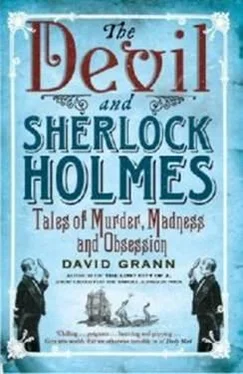In the rare instances when the police arrested a reputed mobster, Strollo and his associates paid off the judges. Once, a judge refused to fix an assault case, and so Strollo dispatched Batcho with a walkie-talkie and a silencer to wound the defense attorney, Gary Van Brocklin, in order to force a mistrial. As Batcho later recalled, “I said, ‘Are you attorney Gary Van Brocklin?’ And he said, ‘Yes, I am.’… And I shot him right in the knee.” Andy Arena, who was Kroner’s boss at the F.B.I., told me, “I don’t know how an honest defense attorney could make a living in this town.”
Strollo’s influence extended to the valley’s representative in Congress as well. Traficant’s top aide in the district, Charles O’Nesti, served as the “bagman” between Strollo and the city’s corrupt public officials, as O’Nesti himself later admitted. (Traficant had hired O’Nesti in 1984, despite his claims on the infamous tapes that O’Nesti was a Mob crony whom he would arrest as part of his so-called sting to clean up the valley.) While working for Traficant, O’Nesti would meet Strollo at the don’s farm or scheme with him on the phone. The two even conspired to steal a stretch of city pavement as it was being laid down.
The F.B.I. sting that would start unravelling this web of corruption began in 1994. By then, Kroner was married and had two daughters; and he had given up smoking through hypnotism and put several pounds on his slender frame. One morning, as he met with other agents in their cramped local office, he was despairing. He had recently witnessed the disintegration of one of his few triumphs: fourteen months after he had secured a conviction against Strollo for gambling, his nemesis had reemerged from prison and reasserted his power. Even when we bust them, Kroner thought, they just come back.
So Kroner and his colleagues opted for a new approach. Rather than attack the Mob from the top, as they had in the past, they’d start at the bottom, with the numbers runners and the stick handlers at the barbut games. The investigation was based on the theory of carpenter ants-if you don’t eliminate all of them, they simply multiply again. Kroner says, “We set forth right in the beginning that we were not going to stop until we got to the nest, and if it meant having to work deals with people we had lots of evidence against, that’s what we were going to do.”
One of the first people they persuaded to cooperate was a local bookie named Michael Sabella, whose clothes always smelled of fish. After being questioned by the feds on a separate matter, he agreed to wear a wire around to the county’s gambling dens. Eventually, he provided enough evidence that investigators were able to wiretap several low-level members of Strollo’s sprawling enterprise, who, in turn, gave them enough evidence to tap more phones, and so on. As the number of intercepted conversations grew into the thousands, Kroner and his partners, John Stoll and Gordon Klau, spent days and nights sifting through transcripts. “We really put a strain on our families,” Kroner once told a reporter. “It was a difficult period.”
Still, after more than a year they hadn’t penetrated Strollo’s inner circle. Hoping to “shake the tree,” as Kroner put it, the agents raided several gambling joints. Afterward, they had established enough links to Strollo that a judge granted them the authority to install listening devices in the don’s kitchen and to tap his telephones. Kroner and his colleagues soon began picking up snippets of incriminating conversations. They heard what sounded like a plot to shake down a priest and what some “asshole did before… he got whacked.”
At one point, Kroner received a tip from an informant that Strollo was planning to kill one of his rivals, Ernie Biondillo. Feeling a moral obligation to warn Biondillo, Kroner picked up the phone and called him. “This is Bob Kroner,” he said. “You know who I am?”
“Yeah, I know who you are.”
“Well, I need to sit down and talk to you alone.”
They met that night in a dark parking lot. Biondillo was in his Cadillac, and pulled alongside Kroner’s car. The men spoke through their open windows. Kroner hoped the warning would encourage Biondillo to cooperate with the investigation. But Biondillo just kept saying, Who the fuck wants to kill me?
Kroner looked at him warily. “I can’t tell you that. I’m not out here to start a war.”
Unable to get an answer, Biondillo drove off in his Cadillac. Several months later, he was riding in his car and turned down a deserted street, when two vehicles boxed him in. A pair of men wearing rubber masks and holding guns opened fire, killing him.
Though Kroner was sure that the hit was ordered by Strollo, the F.B.I. still didn’t have the evidence to arrest him. But, by the summer of 1996, the authorities were closing in, and Strollo, sensing it, became increasingly paranoid. On the phone, he spoke almost exclusively in code. Once, Strollo had a premonition that a longtime confidant was wearing a wire, even though he wasn’t. Another time, Strollo became convinced that an airplane flying overhead was tailing one of his bookies. When someone tried to calm him down, he snapped, “This is my life you’re talking about… I got to fight for survival.”
Strollo was consumed with his nemesis, Kroner. On the telephone, he would say, “Bob, can you hear me? Can you hear me?” Strollo sent one of his men to find out if Kroner’s father could be paid off to control his renegade son, but word came back that the father was honest, too. Knowing his phones were tapped, Strollo tried to plant evidence to suggest that Kroner was somehow on the take. He told associates that Kroner had received bribes from Little Joey and was running drugs through the valley.
One day, Strollo sounded threatening toward Kroner and other F.B.I. agents. “I don’t know what I’m going to have to do about these guys,” he said. Not long afterward, unbeknownst to the F.B.I., Strollo ordered the assassination of Gains. The bungled hit-and the phone call from the “scorned woman,” as Kroner referred to the Mob associate’s former girlfriend who contacted Gains-broke open the F.B.I.’s investigation. In 1997, Bernie the Jew, Riddle, and Harris were all charged with attempted murder. As Batcho was walking near his house, an unmarked car pulled up behind him and two men jumped out. “Are you Mark Batcho?” one of them said.
“No, I’m not Mark Batcho. I don’t know him.”
Despite his denials, Batcho was taken into custody, where he became what he called “the lowest form of life”-a Mob rat. Kroner and his men had finally infiltrated the Mafia’s “nest.” On a cold morning shortly before Christmas in 1997, F.B.I. agents fanned out through the valley, arresting more than twenty-eight Mob associates. Kroner showed up at Strollo’s door with an arrest warrant. As Strollo was being handcuffed, he said to Kroner, “Are you happy now, Bob?”
In the end, nearly all of Strollo’s underlings pleaded guilty and turned evidence against one another, except for Bernie the Jew and Riddle, the two men who had adopted the old Sicilian code, even though they could never be officially inducted into the Mafia. “The only ones who had any balls were a schwartze and a sheeny,” said one of the lawyers involved in the case.
Just before Bernie was about to go on trial, he insisted that Strollo would never turn on them and break his oath of silence. But even as Bernie was speaking Strollo was cutting a deal with the prosecution. Strollo told Kroner, “You win.”
“I will probably be under indictment” in the next few months, Traficant said on C-SPAN, staring into the camera. It was March, 2000, almost two decades since he was first arrested by Kroner and the F.B.I. The Congressman, who was now running for his ninth term in the House of Representatives, wore a sombre black coat and tie; his pompadour was sticking up more than usual, and his long sideburns gave him the look of an aging biker. In his sixteen years in Congress, Traficant had earned a reputation as an eccentric populist. He often appeared on the House floor, in polyester suits, speaking about the plight of the working class and railing against the I.R.S.; he closed his speeches with the signature line “Beam me up, Mr. Speaker.” In a political city seemingly without memory, he had become known as simply “the honorable gentleman from Ohio.”
Читать дальше











